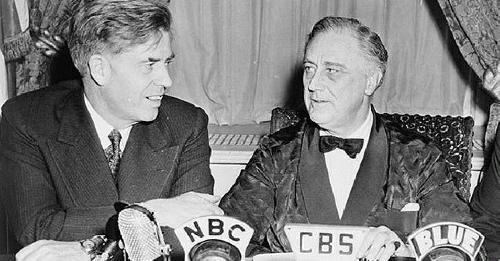From Common Dreams
Now might be a really good time to examine the origins and nature of the whole right-wing collusion between business and government

Vice President Henry Wallace (left) with President Franklin D. Roosevelt.
(Image by (Photo: Library of Congress)) Details DMCA
Given how reactive hard right snowflakes have gotten in response to a few truth-based jokes from Michelle Wolf, and that Mick Mulvaney has confessed to running a pay-for-play operation out of his congressional office, and Trump is daily breaking the Constitution's emoluments clause, now might be a really good time to examine the origins and nature of the whole right-wing business/government model known as "fascism."
Although most Americans remember that Harry Truman was Franklin D. Roosevelt's Vice President when Roosevelt died in 1945 (making Truman President), Roosevelt had two previous Vice Presidents -- John N. Garner (1933-1941) and Henry A. Wallace (1941-1945).
In early 1944, the New York Times asked Vice President Henry Wallace to, as Wallace noted, "write a piece answering the following questions: What is a fascist? How many fascists have we? How dangerous are they?"
Vice President Wallace's answer to those questions was published in The New York Timeson April 9, 1944, at the height of the war against the Axis powers of Germany and Japan.
"The really dangerous American fascists," Wallace wrote, "are not those who are hooked up directly or indirectly with the Axis. The FBI has its finger on those. The dangerous American fascist is the man who wants to do in the United States in an American way what Hitler did in Germany in a Prussian way. The American fascist would prefer not to use violence. His method is to poison the channels of public information."
And [he] continued, "With a fascist the problem is never how best to present the truth to the public but how best to use the news to deceive the public into giving the fascist and his group more money or more power."
In this, Wallace was using the classic definition of the word "fascist" -- the definition Mussolini had in mind when he claimed to have invented the word. (It was actually Italian philosopher Giovanni Gentile who wrote the entry in the Encyclopedia Italiana that said: "Fascism should more appropriately be called corporatism because it is a merger of state and corporate power." Mussolini, however, affixed his name to the entry, and claimed credit for it.)
As the 1983 American Heritage Dictionary noted, fascism is: "A system of government that exercises a dictatorship of the extreme right, typically through the merging of state and business leadership, together with belligerent nationalism."
Mussolini was quite straightforward about all this. In a 1923 pamphlet titled "The Doctrine of Fascism" he wrote, "If classical liberalism spells individualism, Fascism spells government." But not a government of, by, and for We The People -- instead, it would be a government of, by, and for the most powerful corporate interests in the nation.
In 1938, Mussolini brought his vision of fascism into full reality when he dissolved Parliament and replaced it with the "Camera dei Fasci e delle Corporazioni" -- the Chamber of the Fascist Corporations. Corporations were still privately owned, but now instead of having to sneak their money to folks like Mick Mulvaney or Scott Pruitt and covertly write legislation in a soundproof telephone booth, they were openly in charge of the government.
Vice President Wallace bluntly laid out in his 1944 Times article his concern about the same happening here in America:
"If we define an American fascist as one who in case of conflict puts money and power ahead of human beings, then there are undoubtedly several million fascists in the United States. There are probably several hundred thousand if we narrow the definition to include only those who in their search for money and power are ruthless and deceitful. ... They are patriotic in time of war because it is to their interest to be so, but in time of peace they follow power and the dollar wherever they may lead."
Nonetheless, at that time there were few corporate heads who would run for political office, and, in Wallace's view, most politicians still felt it was their obligation to represent We The People instead of corporate cartels.
(Note: You can view every article as one long page if you sign up as an Advocate Member, or higher).





